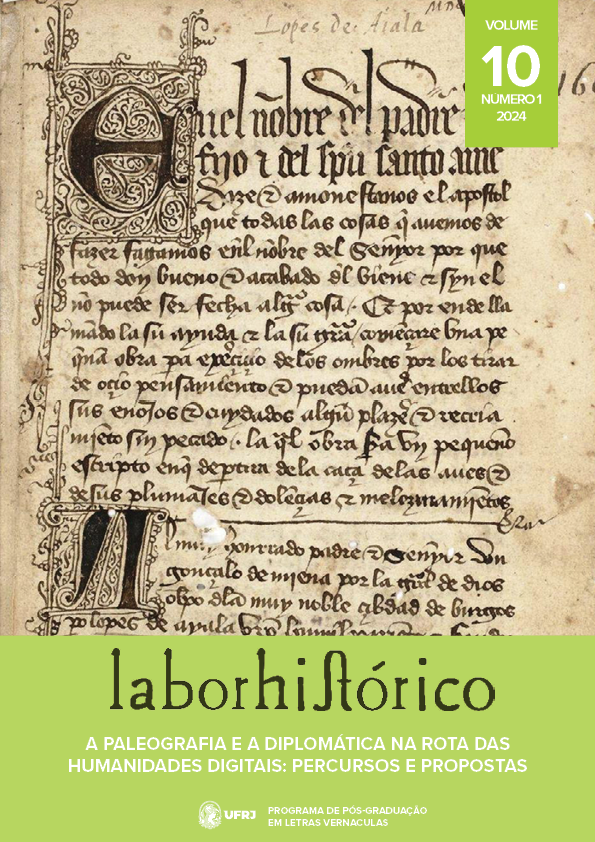Parish sources on digital bases: The Beyond Center-South Project and the Portuguese-Brazilian population studies
DOI:
https://doi.org/10.24206/lh.v10i1.63291Keywords:
Fontes Eclesiásticas, História das Populações, Humanidades Digitais, NACAOB.Abstract
This work is the result of an ongoing research at the Federal University of Rio Grande do Sul, Brazil, and is part of a broader project called “Beyond the Center-South: for a history of the colonial population in the extremes of Portuguese domains in America”, which objective is to build a broad database about the population of Portuguese and, later, Brazilian territories, during the 18th and 19th centuries, in order to advance the investigation of the demographic regimes that characterized the region. The project is an inter-institutional initiative, started in 2008, and has sought to standardize methodological procedures for collecting and processing document sources, enabling comparative analyses in time and space. The initiative promotes the indexing of document bases, mainly of an ecclesiastical nature, using the NACAOB software, enabling the reconstitution of families using the methodology proposed by Fleury and Henry. To date, more than 175 thousand records have been registered, covering more than 830 thousand individuals. For this study, we established as a sample the documentation of the parish of Triunfo, located in the Rio Grande de São Pedro Captaincy, between the mid-18th and early 19th centuries.
Downloads
References
AQUINO, Israel (2019). Redes de compadrio, hierarquia e interdependência social (Viamão – 1747-1773). Porto Alegre: PPGH/UFRGS. Dissertação de Mestrado. Disponível em https://lume.ufrgs.br/handle/10183/197335.
FARINATTI, Luis Augusto (2011). Relações parentais de escravos, libertos e indígenas na Fronteira Meridional (1817-1844): Primeiras notas de pesquisa. Anais do V Encontro Escravidão e Liberdade no Brasil Meridional, Porto Alegre. Disponível em http://www.escravidaoeliberdade.com.br/site/images/Textos5/farinatti%20luiz%20augusto%20ebling.pdf.
FLEURY, Michel; HENRY, Louis. Nouveau manuel de dépouillement et d’exploitation de l’État civil ancien. Paris: INED, 1965.
FREITAS, Fernando de Castro (1985). Triunfo – História, Gente e Legendas. Porto Alegre: Martins Livreiro.
GINZBURG, C.; PONI, C. (1989). O nome e o como: troca desigual e mercado historiográfico. In: GINZBURG, C.; PONI, C. A micro-história e outros ensaios. Rio de Janeiro: DIFEL, p. 169-178.
HAMEISTER, Martha Daisson (2011). O uso dos registros batismais para o estudo de hierarquias sociais no período de vigência da escravidão. Anais do V Encontro Escravidão e Liberdade no Brasil Meridional, Porto Alegre. Disponível em http://www.escravidaoeliberdade.com.br/site/images/Textos5/hameister%20martha%20daisson.pdf.
KUHN, Fábio (2006). Gente da fronteira: família, sociedade e poder no sul da América – século XVIII. Niterói: PPGH/UFF. Tese de Doutoramento. Disponível em https://www.historia.uff.br/stricto/teses/Tese-2006_KUHN_Fabio-S.pdf.
MONTEIRO, John Manuel (1994). Negros da terra: índios e bandeirantes nas origens de São Paulo. São Paulo: Companhia das Letras.
NADALIN, S.; SCOTT, D. (2017). Além do Centro-Sul: por uma história da população colonial nos extremos dos domínios portugueses na América (projeto integrado). Revista Brasileira de Estudos de População , v. 34, n. 3, p. 649-657.
ROCCA, Luisa Durán (2009). Açorianos no Rio Grande do Sul – Antecedentes e formação do espaço urbano do século XVIII. Porto Alegre: PROPUR/UFRGS. Tese de Doutoramento. Disponível em https://lume.ufrgs.br/handle/10183/17918.
ROWLAND, Robert. (1997). Regime demográfico e sistema familiar. In: ROWLAND, Robert. População, Família, Sociedade: Portugal, séculos XIX-XX. Lisboa: Etnográfica Press. [Consult. 29 de setembro de 2021]. Disponível em: http://books.openedition.org/etnograficapress/449.
RUBERT, Arlindo (1994). História da igreja no Rio Grande do Sul. Porto Alegre: EDIPUCRS.
SCOTT, Dário. (2013). Manual de instalação e utilização do software NACAOB. Campinas: UNICAMP.
SOARES, Mariza (2000). Devotos da cor: identidade étnica, religiosidade e escravidão no Rio de Janeiro, século XVIII. Rio de Janeiro: Civilização Brasileira.
Downloads
Published
Issue
Section
License
Copyright (c) 2024 Israel Aquino Cabreira, Tomás Lacerda Spindler Guedes

This work is licensed under a Creative Commons Attribution-NonCommercial 4.0 International License.
Authors who publish with this journal agree to the following:
a. The authors hold copyright of the published papers; authors are the sole responsible party for published papers content; the published paper is licensed under a Creative Commons Attribution-NonCommercial 4.0 International License which allows the sharing of the publication as long as there is acknowledgement of authorship and publishing by Revista LaborHistórico.
b. Authors should seek previous permission from the journal in order to publish their articles as book chapters. Such publications should acknowledge first publishing by LaborHistórico.
c. Authors may publish and distribute their papers (for example, at institutional repositories, author's sites) at any time during or after the editorial process by Revista LaborHistórico.


